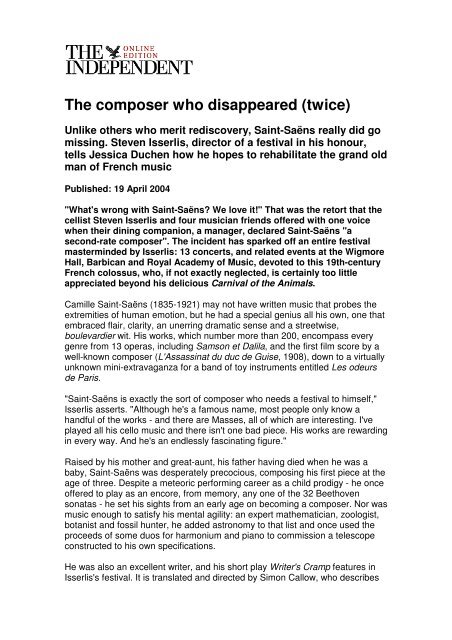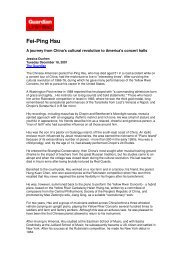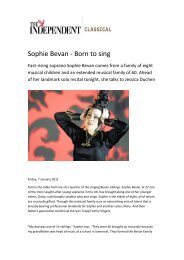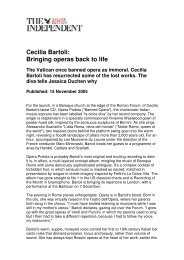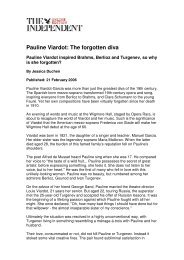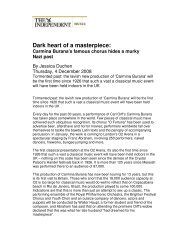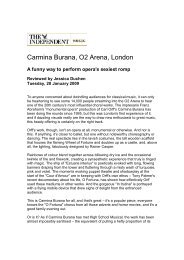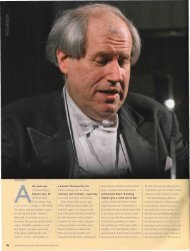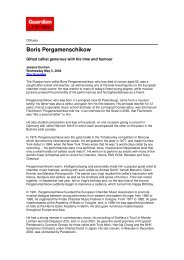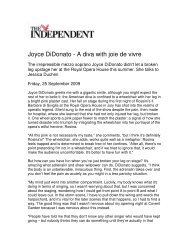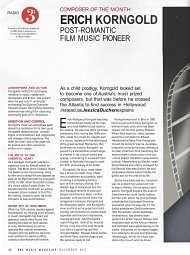The composer who disappeared (twice) - Jessica Duchen
The composer who disappeared (twice) - Jessica Duchen
The composer who disappeared (twice) - Jessica Duchen
Create successful ePaper yourself
Turn your PDF publications into a flip-book with our unique Google optimized e-Paper software.
<strong>The</strong> <strong>composer</strong> <strong>who</strong> <strong>disappeared</strong> (<strong>twice</strong>)<br />
Unlike others <strong>who</strong> merit rediscovery, Saint-Saëns really did go<br />
missing. Steven Isserlis, director of a festival in his honour,<br />
tells <strong>Jessica</strong> <strong>Duchen</strong> how he hopes to rehabilitate the grand old<br />
man of French music<br />
Published: 19 April 2004<br />
"What's wrong with Saint-Saëns? We love it!" That was the retort that the<br />
cellist Steven Isserlis and four musician friends offered with one voice<br />
when their dining companion, a manager, declared Saint-Saëns "a<br />
second-rate <strong>composer</strong>". <strong>The</strong> incident has sparked off an entire festival<br />
masterminded by Isserlis: 13 concerts, and related events at the Wigmore<br />
Hall, Barbican and Royal Academy of Music, devoted to this 19th-century<br />
French colossus, <strong>who</strong>, if not exactly neglected, is certainly too little<br />
appreciated beyond his delicious Carnival of the Animals.<br />
Camille Saint-Saëns (1835-1921) may not have written music that probes the<br />
extremities of human emotion, but he had a special genius all his own, one that<br />
embraced flair, clarity, an unerring dramatic sense and a streetwise,<br />
boulevardier wit. His works, which number more than 200, encompass every<br />
genre from 13 operas, including Samson et Dalila, and the first film score by a<br />
well-known <strong>composer</strong> (L'Assassinat du duc de Guise, 1908), down to a virtually<br />
unknown mini-extravaganza for a band of toy instruments entitled Les odeurs<br />
de Paris.<br />
"Saint-Saëns is exactly the sort of <strong>composer</strong> <strong>who</strong> needs a festival to himself,"<br />
Isserlis asserts. "Although he's a famous name, most people only know a<br />
handful of the works - and there are Masses, all of which are interesting. I've<br />
played all his cello music and there isn't one bad piece. His works are rewarding<br />
in every way. And he's an endlessly fascinating figure."<br />
Raised by his mother and great-aunt, his father having died when he was a<br />
baby, Saint-Saëns was desperately precocious, composing his first piece at the<br />
age of three. Despite a meteoric performing career as a child prodigy - he once<br />
offered to play as an encore, from memory, any one of the 32 Beethoven<br />
sonatas - he set his sights from an early age on becoming a <strong>composer</strong>. Nor was<br />
music enough to satisfy his mental agility: an expert mathematician, zoologist,<br />
botanist and fossil hunter, he added astronomy to that list and once used the<br />
proceeds of some duos for harmonium and piano to commission a telescope<br />
constructed to his own specifications.<br />
He was also an excellent writer, and his short play Writer's Cramp features in<br />
Isserlis's festival. It is translated and directed by Simon Callow, <strong>who</strong> describes
this 13-minute farce as "a bon-bon - a slight satire on the modern school of<br />
novel writing and theatre, a game of art and life".<br />
Callow has long counted Saint-Saëns as a favourite <strong>composer</strong>. "I love his music<br />
most of all for its extraordinary elegance and individual variety of wit,' he<br />
enthuses. 'As he said himself, he wrote music "as an apple tree grows apples".<br />
His craft is elevated to a pitch of such strength and confidence that he's able to<br />
produce things of beauty to order. I like to think of Saint-Saëns as a wonderful<br />
chef. Nothing is ever too heavy; and always there's some fresh, original<br />
ingredient, some spice that he's found in the Orient or picked up on the Nile to<br />
create an excellent new culinary sensation. He's the Escoffier of music!"<br />
But what was wrong with Saint-Saëns? His music's debonair exterior has little to<br />
do with the <strong>composer</strong>'s inner self. "Art is intended to create beauty and<br />
character," he wrote. "Feeling only comes afterwards and art can very well do<br />
without it. In fact, it is very much better off when it does." All the fluidity,<br />
flamboyance and sparkle was effectively a mask for a troubled man <strong>who</strong><br />
preferred not to betray the darker side of his soul. As with many great<br />
comedians, his art concealed an existence that contained more than its fair<br />
share of tragedy.<br />
It's generally thought today that Saint-Saëns was homosexual, but tried for<br />
years to live a "normal" life. Aged 40, he married Marie Truffot, some 20 years<br />
his junior; they settled, together with Saint-Saëns's ever-dominant mother, in a<br />
fourth-floor apartment in Paris, and soon had two infant sons. But in 1878, twoyear-old<br />
André fell out of a window and was instantly killed. Overcome with<br />
grief, Marie was unable to feed the six-month-old baby; he was sent to her<br />
mother for care, but failed to thrive and died soon afterwards.<br />
Saint-Saëns - <strong>who</strong>, in a stroke of horrible irony, had been writing his Requiem<br />
just beforehand - never recovered from the loss of his children and felt that his<br />
wife was to blame. His marriage hung by a thread for three years, until, while<br />
the couple were on holiday, he went out one day - and never went back. He<br />
never saw Marie again. She turned up, heavily veiled, at his state funeral.<br />
He vanished for a second time not long after his mother's death in 1888 -<br />
apparently without trace, until he turned up in Las Palmas, living under an<br />
assumed name. For the rest of his life, he travelled extensively, particularly in<br />
North Africa; and his wanderings helped to inspire such works as his Africa<br />
Fantasy and his Fifth Piano Concerto, which depicts his impressions of Egypt.<br />
Whether his disappearances and restlessness were an attempt to escape his<br />
harsh memories, or the pursuit of a life in lands where he could more easily and<br />
anonymously fulfil his predilections, remains a moot point among scholars. So,<br />
too, does the possibility that the unrequited love of his life might have been his<br />
pupil and protégé, the handsome and rampantly heterosexual Gabriel Fauré,<br />
<strong>who</strong> owed much of his career directly to Saint-Saëns.<br />
In his last years, despite the favour of Queen Victoria (<strong>who</strong> personally, and<br />
fruitlessly, begged Covent Garden to stage one of his operas) and the award of<br />
Grand Croix de Légion d'honneur, France's highest mark of acclaim, Saint-<br />
Saëns was a solitary, embittered individual, his days brightened only by his<br />
poodle, Dalila. He had grown to prefer animals to human beings. That affection
shines through the glittering frippery of <strong>The</strong> Carnival of the Animals, which he<br />
prevented from being published in his lifetime, suspecting, rightly, that it would<br />
become too popular for his own good.<br />
His philosophical tract, Problemes et Mystères, was perhaps the closest Saint-<br />
Saëns came to revealing his state of mind. "People have always been<br />
disappointed in their search for final causes," he wrote. "It may be simply that<br />
there are no such things. At any rate, whether they do exist or not, it does not<br />
make the slightest bit of difference to us... <strong>The</strong> joys which nature gives to us<br />
and does not withhold entirely from even the most abandoned among us - the<br />
discovery of new truths, the enjoyment of art, the spectacle of suffering eased<br />
and attempts to cure it as far as possible - all these are enough for the<br />
happiness of life. One is inclined to fear that everything else is madness and<br />
illusion."<br />
But why is Saint-Saëns still so underrated? Isserlis suggests the <strong>composer</strong>'s<br />
vitriolic personality didn't do him any favours: "He made a great many enemies<br />
during his lifetime." Sir Thomas Beecham, <strong>who</strong> had conducted Saint-Saëns in<br />
the <strong>composer</strong>'s own piano concertos, described him as "a most irritable man".<br />
And once the <strong>composer</strong> rebuffed a dinner invitation from an enthusiastic fan<br />
<strong>who</strong> begged him, "But could you not be very nice, just for me?" by saying: "I<br />
don't want to be nice to you."<br />
Nor was he gentle with young <strong>composer</strong>s he considered too experimental,<br />
notably Debussy. Although in his youth Saint-Saëns had championed advanced<br />
musicians such as Liszt, Schumann and Mendelssohn, and in 1871 founded the<br />
Societé Nationale de Musique to promote the music of young French<br />
<strong>composer</strong>s, he later morphed into a hardline musical conservative, engendering<br />
plenty of grudges along the way.<br />
Isserlis feels, however, that Saint-Saëns's cranky image has been overstated:<br />
"He has a bad reputation and I think it's unfair. He was a lonely man, but not a<br />
bad person and not unkind. I've heard people say that he was anti-Semitic, but<br />
apparently he gave money for the defence in the Dreyfus trial. And all his life he<br />
was extremely good to Fauré, <strong>who</strong> I think became virtually a substitute son for<br />
him."<br />
Isserlis has assembled a galaxy of musical luminaries for his festival, among<br />
them the violinists Joshua Bell and Renaud Capuçon, the pianists Pascal<br />
Devoyon and Graham Johnson, the Florestan Trio, the baritone Françoix le<br />
Roux and many more. <strong>The</strong> opening concert on 21 April features an all-star lineup<br />
in - naturally - <strong>The</strong> Carnival of the Animals; the grand finale on 18 May<br />
presents music from the Parisian salons, including three UK premieres and<br />
ending with Les odeurs de Paris.<br />
"In that concert, everyone is playing without a fee," says Isserlis, "and I hope<br />
we'll raise enough money to start a Saint-Saëns Society. He deserves one. <strong>The</strong><br />
festival isn't going to change the world, but for a short time it could make it a<br />
slightly better place."
Saint-Saëns Festival, directed by Steven Isserlis: Wigmore Hall, London WC1<br />
(020-7935 2141), 21, 27 April, 8, 9 14, 16, 17 & 18 May; Barbican, London EC2<br />
(020-7638 8891), 22 April; Royal Academy of Music (020-7873 7300), 14 May


